American King 2.0
Roll cameras! Aaaannnddd... ACTION!
To fully understand the events of the Great Revolution, we must go back to earlier decades of the Glorious Century, the 1700's. Following France's defeat in the Seven Years' War (1756-63), and the rise of Britain as the supreme world power, Louis XV, great-grandson of the Sun King, was forced to sign away most of France's New World colonies. This left Britain extremely wealthy, but still, it had war debts, as it also fought alongside Frederick II, the Great, against the Austrians and French in mainland Europe. King George III (who succeeded his grandfather George II in 1760) was the latest British sovereign of the House of Hanover, and he needed tax money, and the American colonies were a great source of income. After all, the colonists had had the protection of the might British army and navy during the Seven Years' War, so why should not they pay for it? The King could not run the government for free, after all. Even after the Seven Years', as late as 1766, the Redcoats were fighting Pontiac's Rebellion against those Indian tribes formerly allied to the French. On October 7th, 1763, George set up the Proclamation Line to protect those "infernal colonists," and they were not even grateful! Taxes, taxes, and, above all, more taxes, were required to pay for the New World shenanigans and the expanding empire. The Parliament soon issued the Sugar and Currency Acts (1764), taking away the colonies' rights to print money, and claiming, "It is expedient that new provisions and regulations should be established for improving the revenue of this Kingdom ... and ... it is just and necessary that a revenue should be raised ... for defraying the expenses of defending, protecting, and securing the same." Shockingly, these acts proved wildly unpopular and the colonists rioted in the streets. Late to the party was the Stamp Act (1765), which infuriated most Americans. Riots and violence broke out, which the British mercilessly crushed. Virginia's Burgesses claimed the motherland could not tax Virginians under British law; "only Virginians can tax Virginians." The final kick in the crotch came with the enactment of the Quartering Act, allowing roving mobs of British soldiers and sailors to "loot, pillage, and make themselves at home on private property."
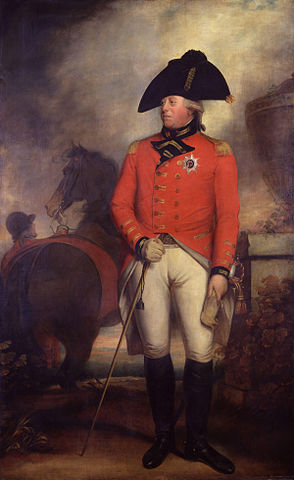
George III, By the Grace of God, of Great Britain, France and Ireland, King, Defender of the Faith, Prince-Elector of Hanover, Duke of Brunswick
The Parliament's refusal to repeal the Stamp and Quartering Acts resulted in the New York Rebellion of 1766, when New Yorkers took up arms against the British garrisons. After the quickly-but-bloodily-won victory by the British government, New York's government was suspended and numerous arrests ensued, including that of revolutionary Seven Years' War veteran Captain James DeLancey, a member of the radical Sons of Liberty movement.
After squashing the New York Independence movement, the King and Parliament flaunted their victory with the Declaratory Act, essentially rubbing in the colonists' faces that, "We can do what we want, when we want, for whatever reason we want, and you cannot do anything about it," along with the Townshend Act, yet another tax.
Burgeoning under all these unwanted tyrannies, many colonists became open opponents of Britain. King George watched with shock and anger, in March 5th, 1770, shortly after the election of Lord North as Prime Minister, as Americans, upon reading To the Betrayed Inhabitants of the City of Boston (a Sons of Liberty broadside), seized fifty sleeping British troops garrisoned in Boston, dragged them out of their barracks, impaled them "like flags" upon pikes, and hoisted the corpses at Boston Harbour for all to see. It was known as "The Bostonian Massacre," and it made the English cry out for revenge. It was not long before they would have it.
The so-called "War of the Regulation" (1765-1770), in western North Carolina, was a rebellion of the citizens against the colonial government in protest to the "Intolerable Acts" passed by Parliament. The British knew it could incite unrest in the other areas, especially after The Bostonian Massacre, and immediately brought in professional soldiers to assist Governor William Tyron in crushing the insurgency. At the Battle of Alamance, over three hundred rebels were captured by Redcoats and executed. In retaliation, a mob in New York City, a location under martial law since the Rebellion of '66, stormed a compound, freeing numerous prisoners and taking hostage five hundred British troops. They then declared that they would execute ten soldiers every day until the Intolerable Acts were repealed. They practiced what they preached: the next day, ten bodies were hoisted on pikes on Wall Street. After ten days, and one hundred executions, a British counter-attack liberated the prisoners and forced the rebels to flee for their lives. The Wall Street Hostage Crisis was over.
From this time forth, North America plummeted into violence and riots. Following the Hostage Crisis, Sam Adams, a leader of the Sons of Liberty, formed the Committee of Correspondence. This heavily-Masonic organization pulled the strings of power in America, much to the disgruntlement of King George. A further black eye for the crown was the newly-formed (1772) Watauga Republic, along the Louisiana border, which was formed by settlers pushing the limits of the Proclamation Line.
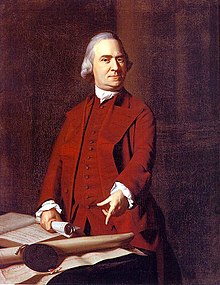
Samuel Adams
Britain responded with the Tea Act. This new act was designed by the East India Company to sell its hugely overpriced tea to the colonists, who would have to pay Townshend Duties, making it even more expensive. The Sons of Liberty, now on the ascension to supreme power over all independence/anti-Britain movements, retaliated with the Boston Tea Party. The Sons of Liberty chapter in Boston, Massachusetts disguised themselves as Indians, complete with tea-stained skin, turbans, scimitars, and explosives, and attacked the ships tied to the docks, massacring the sailors, throwing the tea overboard, and burning the ships. Numerous ships, however, were privateered and taken to an undisclosed location, crewed, repainted, and sent out to sea. This marks the start of the Pirate War (1773-75). British civilian ships were seized, hostages taken, property destroyed, and finally sunk-- if they could not be used as yet more pirate vessels. The Royal Navy was then stretched to its full capacity as piracy broke out all over the empire, inspired by the Tea Party.
Parliament had had enough. They quickly passed the Massachusetts Bay and New York Governing Act, which removed all colonial authorities, installed new ones, raised taxes, beefed up occupational troops, and made support of revolt punishable by death. It was followed quickly by the Proclamation Line of 1774, which pushed the Line of 1763 back east even further, and sent in troops to order and monitor settler relocation. While this helped the all-seeing eye of George watch and control more easily for a while, it made the western rural families and towns hate his guts. The Watauga Republic prepared violent resistance against the Line of 1774. Making the matters worse was the Administration of Justice Act of 1774, which essentially allowed local officials to persecute, execute, or exile anyone they wanted and crush uprisings and protests by whatever means necessary, and the Second Quartering Act.
Violence was to reign supreme during the Powder Confiscation of September 1st, 1774, when British general Thomas Gage, military governor of Massachusetts Bay, seized gunpowder supplies and brought them to Boston, where he could keep an eye on it to keep it out of the hands of "the unruly elements of society." Unfortunately, in a violent, brief skirmish, the same Sons of Liberty members who had started the Boston Tea Party stole most all of it and dispersed it across the colony in all manners of hiding spots, making it impossible to retrieve it all again. Furious, Gage cracked down, triggering riots which resulted in the deaths of fifty civilians. The Sons of Liberty quickly took hostages of soldiers stationed on the Proclamation Line and executed five for every one of the fifty civilians killed. More troops were brought in to "teach those d*** colonists a lesson," as King George so nicely put it to Lord North. Shortly after, the colonists, being pushed to their limits, formed the First Continental Assembly, under the firm control of the Sons of Liberty, and met at Carpenter's Hall, in Philadelphia, Pennsylvania. The Assembly warned King George III that the colonies were being pushed as far as possible, and that the Intolerable Acts should be immediately repealed. The Assembly, consisting of 12 colonies (Georgia was not invited because it was a penal colony), went about forming local chapters of the Sons of Liberty to act as militias and police. Gang brawls between the militias and Redcoats became a common sight, and numerous deaths ensued.
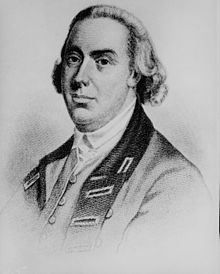
Thomas Gage
On October 19th, 1774, the HMS Peggy Stewart, a Maryland vessel attempting to bring in more "accursed ETC tea," was burned by the Sons of Liberty in Annapolis. It quickly became known as the Annapolis Tea Party. In December, New Jersey members of the Sons of Liberty, acting upon the direct orders of Sam and Johnny Adams, dressed themselves as Indians, again, complete with turbans, scimitars, and tea-stained skin, burned a massive overland shipment of tea bound for Philadelphia. It became known as the Greenwich Tea Party.

The Peggy Stewart Burns
Finally, it came to a head. On April 19th, 1775, Lieutenant Colonel Francis Smith marched 1000 British regulars to arrest and/or disperse (and confiscate the supplies of) the Massachusetts militia, lead by silversmith Paul Revere, at Concord, which was especially infamous for massacres of Redcoats and the burning of tea. At Concord, the British army faced the Sons of Liberty down the barrels of their muskets. As soon as dragoons moved to arrest the leaders, shots were fired. Within thirty minutes, 100 "Lobsterbacks" had perished. Revere ordered his troops to advance, heads of British soldiers mounted on bayonets. Terrified, the British gave ground, only to be hewn down even more. The casualties' heads were quickly mounted, and rebel colonists, now covered in blood, gave chase. The entire army routed and Smith was captured during the retreat. Revere had won a huge victory.
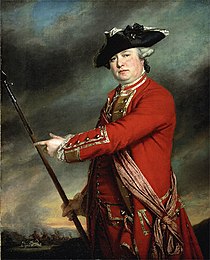
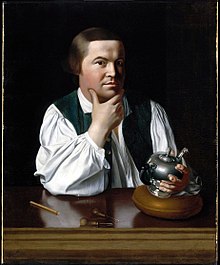
Francis Smith and Paul Revere
Simultaneously, in Boston, revolutionary fervor spread like wildfire. Radicals under the command of Samuel Adams stormed the British stronghold in the city and killed all the defenders. Elsewhere in the town, widespread looting and burning was ensuing as the British were evacuating. The Battles of Boston and Concord had ended. The Great Revolution had begun.
Roll cameras! Aaaannnddd... ACTION!
American King: Take Two
“Surely oppression maketh a wise man mad”
-Ecclesiastes 7:7
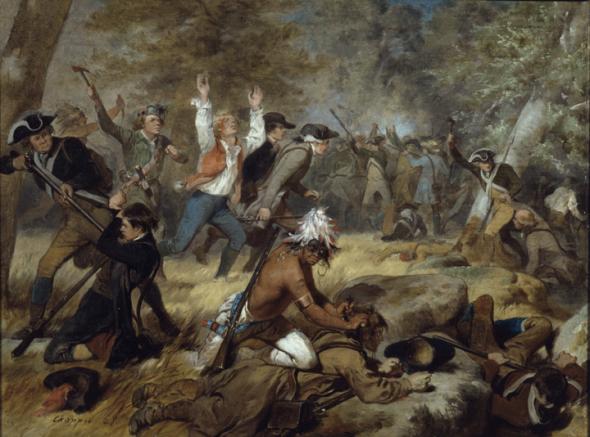
Massacre of the Tories by the Sons of Liberty by Alonzo Chappel
“Surely oppression maketh a wise man mad”
-Ecclesiastes 7:7

Massacre of the Tories by the Sons of Liberty by Alonzo Chappel
To fully understand the events of the Great Revolution, we must go back to earlier decades of the Glorious Century, the 1700's. Following France's defeat in the Seven Years' War (1756-63), and the rise of Britain as the supreme world power, Louis XV, great-grandson of the Sun King, was forced to sign away most of France's New World colonies. This left Britain extremely wealthy, but still, it had war debts, as it also fought alongside Frederick II, the Great, against the Austrians and French in mainland Europe. King George III (who succeeded his grandfather George II in 1760) was the latest British sovereign of the House of Hanover, and he needed tax money, and the American colonies were a great source of income. After all, the colonists had had the protection of the might British army and navy during the Seven Years' War, so why should not they pay for it? The King could not run the government for free, after all. Even after the Seven Years', as late as 1766, the Redcoats were fighting Pontiac's Rebellion against those Indian tribes formerly allied to the French. On October 7th, 1763, George set up the Proclamation Line to protect those "infernal colonists," and they were not even grateful! Taxes, taxes, and, above all, more taxes, were required to pay for the New World shenanigans and the expanding empire. The Parliament soon issued the Sugar and Currency Acts (1764), taking away the colonies' rights to print money, and claiming, "It is expedient that new provisions and regulations should be established for improving the revenue of this Kingdom ... and ... it is just and necessary that a revenue should be raised ... for defraying the expenses of defending, protecting, and securing the same." Shockingly, these acts proved wildly unpopular and the colonists rioted in the streets. Late to the party was the Stamp Act (1765), which infuriated most Americans. Riots and violence broke out, which the British mercilessly crushed. Virginia's Burgesses claimed the motherland could not tax Virginians under British law; "only Virginians can tax Virginians." The final kick in the crotch came with the enactment of the Quartering Act, allowing roving mobs of British soldiers and sailors to "loot, pillage, and make themselves at home on private property."

George III, By the Grace of God, of Great Britain, France and Ireland, King, Defender of the Faith, Prince-Elector of Hanover, Duke of Brunswick
The Parliament's refusal to repeal the Stamp and Quartering Acts resulted in the New York Rebellion of 1766, when New Yorkers took up arms against the British garrisons. After the quickly-but-bloodily-won victory by the British government, New York's government was suspended and numerous arrests ensued, including that of revolutionary Seven Years' War veteran Captain James DeLancey, a member of the radical Sons of Liberty movement.
After squashing the New York Independence movement, the King and Parliament flaunted their victory with the Declaratory Act, essentially rubbing in the colonists' faces that, "We can do what we want, when we want, for whatever reason we want, and you cannot do anything about it," along with the Townshend Act, yet another tax.
Burgeoning under all these unwanted tyrannies, many colonists became open opponents of Britain. King George watched with shock and anger, in March 5th, 1770, shortly after the election of Lord North as Prime Minister, as Americans, upon reading To the Betrayed Inhabitants of the City of Boston (a Sons of Liberty broadside), seized fifty sleeping British troops garrisoned in Boston, dragged them out of their barracks, impaled them "like flags" upon pikes, and hoisted the corpses at Boston Harbour for all to see. It was known as "The Bostonian Massacre," and it made the English cry out for revenge. It was not long before they would have it.
The so-called "War of the Regulation" (1765-1770), in western North Carolina, was a rebellion of the citizens against the colonial government in protest to the "Intolerable Acts" passed by Parliament. The British knew it could incite unrest in the other areas, especially after The Bostonian Massacre, and immediately brought in professional soldiers to assist Governor William Tyron in crushing the insurgency. At the Battle of Alamance, over three hundred rebels were captured by Redcoats and executed. In retaliation, a mob in New York City, a location under martial law since the Rebellion of '66, stormed a compound, freeing numerous prisoners and taking hostage five hundred British troops. They then declared that they would execute ten soldiers every day until the Intolerable Acts were repealed. They practiced what they preached: the next day, ten bodies were hoisted on pikes on Wall Street. After ten days, and one hundred executions, a British counter-attack liberated the prisoners and forced the rebels to flee for their lives. The Wall Street Hostage Crisis was over.
From this time forth, North America plummeted into violence and riots. Following the Hostage Crisis, Sam Adams, a leader of the Sons of Liberty, formed the Committee of Correspondence. This heavily-Masonic organization pulled the strings of power in America, much to the disgruntlement of King George. A further black eye for the crown was the newly-formed (1772) Watauga Republic, along the Louisiana border, which was formed by settlers pushing the limits of the Proclamation Line.

Samuel Adams
Britain responded with the Tea Act. This new act was designed by the East India Company to sell its hugely overpriced tea to the colonists, who would have to pay Townshend Duties, making it even more expensive. The Sons of Liberty, now on the ascension to supreme power over all independence/anti-Britain movements, retaliated with the Boston Tea Party. The Sons of Liberty chapter in Boston, Massachusetts disguised themselves as Indians, complete with tea-stained skin, turbans, scimitars, and explosives, and attacked the ships tied to the docks, massacring the sailors, throwing the tea overboard, and burning the ships. Numerous ships, however, were privateered and taken to an undisclosed location, crewed, repainted, and sent out to sea. This marks the start of the Pirate War (1773-75). British civilian ships were seized, hostages taken, property destroyed, and finally sunk-- if they could not be used as yet more pirate vessels. The Royal Navy was then stretched to its full capacity as piracy broke out all over the empire, inspired by the Tea Party.
Parliament had had enough. They quickly passed the Massachusetts Bay and New York Governing Act, which removed all colonial authorities, installed new ones, raised taxes, beefed up occupational troops, and made support of revolt punishable by death. It was followed quickly by the Proclamation Line of 1774, which pushed the Line of 1763 back east even further, and sent in troops to order and monitor settler relocation. While this helped the all-seeing eye of George watch and control more easily for a while, it made the western rural families and towns hate his guts. The Watauga Republic prepared violent resistance against the Line of 1774. Making the matters worse was the Administration of Justice Act of 1774, which essentially allowed local officials to persecute, execute, or exile anyone they wanted and crush uprisings and protests by whatever means necessary, and the Second Quartering Act.
Violence was to reign supreme during the Powder Confiscation of September 1st, 1774, when British general Thomas Gage, military governor of Massachusetts Bay, seized gunpowder supplies and brought them to Boston, where he could keep an eye on it to keep it out of the hands of "the unruly elements of society." Unfortunately, in a violent, brief skirmish, the same Sons of Liberty members who had started the Boston Tea Party stole most all of it and dispersed it across the colony in all manners of hiding spots, making it impossible to retrieve it all again. Furious, Gage cracked down, triggering riots which resulted in the deaths of fifty civilians. The Sons of Liberty quickly took hostages of soldiers stationed on the Proclamation Line and executed five for every one of the fifty civilians killed. More troops were brought in to "teach those d*** colonists a lesson," as King George so nicely put it to Lord North. Shortly after, the colonists, being pushed to their limits, formed the First Continental Assembly, under the firm control of the Sons of Liberty, and met at Carpenter's Hall, in Philadelphia, Pennsylvania. The Assembly warned King George III that the colonies were being pushed as far as possible, and that the Intolerable Acts should be immediately repealed. The Assembly, consisting of 12 colonies (Georgia was not invited because it was a penal colony), went about forming local chapters of the Sons of Liberty to act as militias and police. Gang brawls between the militias and Redcoats became a common sight, and numerous deaths ensued.

Thomas Gage
On October 19th, 1774, the HMS Peggy Stewart, a Maryland vessel attempting to bring in more "accursed ETC tea," was burned by the Sons of Liberty in Annapolis. It quickly became known as the Annapolis Tea Party. In December, New Jersey members of the Sons of Liberty, acting upon the direct orders of Sam and Johnny Adams, dressed themselves as Indians, again, complete with turbans, scimitars, and tea-stained skin, burned a massive overland shipment of tea bound for Philadelphia. It became known as the Greenwich Tea Party.

The Peggy Stewart Burns
Finally, it came to a head. On April 19th, 1775, Lieutenant Colonel Francis Smith marched 1000 British regulars to arrest and/or disperse (and confiscate the supplies of) the Massachusetts militia, lead by silversmith Paul Revere, at Concord, which was especially infamous for massacres of Redcoats and the burning of tea. At Concord, the British army faced the Sons of Liberty down the barrels of their muskets. As soon as dragoons moved to arrest the leaders, shots were fired. Within thirty minutes, 100 "Lobsterbacks" had perished. Revere ordered his troops to advance, heads of British soldiers mounted on bayonets. Terrified, the British gave ground, only to be hewn down even more. The casualties' heads were quickly mounted, and rebel colonists, now covered in blood, gave chase. The entire army routed and Smith was captured during the retreat. Revere had won a huge victory.


Francis Smith and Paul Revere
Simultaneously, in Boston, revolutionary fervor spread like wildfire. Radicals under the command of Samuel Adams stormed the British stronghold in the city and killed all the defenders. Elsewhere in the town, widespread looting and burning was ensuing as the British were evacuating. The Battles of Boston and Concord had ended. The Great Revolution had begun.
Last edited: